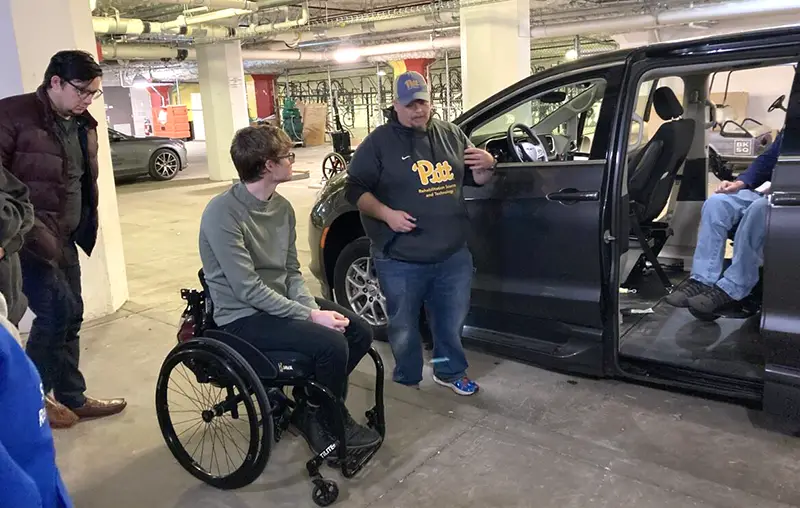As a current student in the University of Pittsburgh School of Health and Rehabilitation Sciences program, I want to share my experience. Rehabilitation Technology is an integral part of healthcare, requiring empathy and a deep understanding of patients. These professionals, central to diverse healthcare teams, cater to individuals from various backgrounds in order to ensure top-notch care for everyone seeking assistance.
So, why should one specialize in Rehabilitation Technology? Let's define it first: Rehabilitation Technology, also known as Assistive Technology, encompasses devices, software, and products designed to maintain or enhance an individual's wellbeing. While often targeting people with disabilities, these innovations are universally applicable.

Initially, I thought assistive technology might involve using video games for rehabilitation purposes. However, I soon learned it was more about utilizing various tools, including video games, to make the lives of those with limitations more enjoyable. This initial curiosity led me down a path of exploration, uncovering a wealth of information on different assistive technologies. What fascinated me the most was the stark contrast between low-tech and high-tech solutions. For instance, a simple PVC pipe filled with playdough and a spoon inserted for easier grip can significantly improve mealtime for someone with limited hand function. The sheer simplicity and cost-effectiveness of such solutions amazed me.
On the other end of the spectrum, I learned about high-tech devices like eye gaze systems. These innovations assist individuals with conditions like Locked-in Syndrome, allowing communication through eye movements tracked by specialized software. Witnessing how technology could facilitate connection and drastically improve someone's quality of life was truly inspiring.
So, why does this field matter? The primary goal is to empower people to lead healthy, independent lives. Independence is crucial, and assistive technology aims to enable individuals to pursue happiness without their conditions hindering them. It's about minimizing daily challenges for those who face them.
Professionals in this domain, known as Assistive Technology Professionals (ATPs), come from diverse backgrounds – engineers, healthcare experts, psychologists, and more. They're adept at selecting, training, and customizing assistive technology to suit individual needs. As an example, for a person with mobility challenges, an ATP will analyze the needs of the client, assist in the selection of an appropriate wheelchair, and provide training on how best to use the chair.
The avenues in assistive technology are diverse: from research & development to providing and training users, or specializing in seating & mobility. Each path offers a unique expertise, making this profession both versatile and fulfilling.
Here is a quote from a current student who explains why he pursued this career and how he wants to continue to grow as an ATP. His experience at NuMotion, a rehabilitation equipment provider, highlighted the meaningful impact this field offers:
"Initially, I decided to pursue Rehabilitation Technology because I loved all the sciences & engineering and desired a career where I could help others in a meaningful way. I quickly found satisfaction in both my studies and co-op at NuMotion, a complex rehabilitation equipment provider. I feel deeply fulfilled and assured that my effort is improving a person's quality of life – I can see tense eyebrows relax, hear eased breathing, and feel their excitement to access more of the life they deserve. These interactions motivate me to learn, work hard, and be grateful every day."
– Matthew Kim, University of Pittsburgh Master of Rehabilitation Technology '24
The University of Pittsburgh offers a fantastic start in this career path through its Masters of Rehabilitation Technology program. Situated in Pittsburgh, with abundant resources like the VA and the Center for Assistive Technology, it provides an excellent environment to nurture aspiring ATPs. The coursework covers a diverse array, from research and technology development to professional conduct in the industry.
Joining this field is not just about a career; it's about making a tangible difference in people's lives. Rehabilitation Technology is where innovation meets compassion, offering endless opportunities to impact lives positively. Learn more about the program at the University of Pittsburgh website.
About the Author
Tyler Davis received a degree in Kinesiology from the University of North Carolina at Greensboro in 2022. He is currently a student at the University of Pittsburgh pursuing a master's degree in Rehabilitation Technology and looks forward to graduating in August 2024. Tyler recently won the Virginia Kaufman Award for outstanding accomplishments as a student in the Department of Rehabilitation Science and Technology. He's especially interested in the research and development of assistive technology that helps improve quality of life and activities of daily living. When he isn't working or studying, he enjoys playing and watching soccer, gaming, and exploring Pittsburgh.